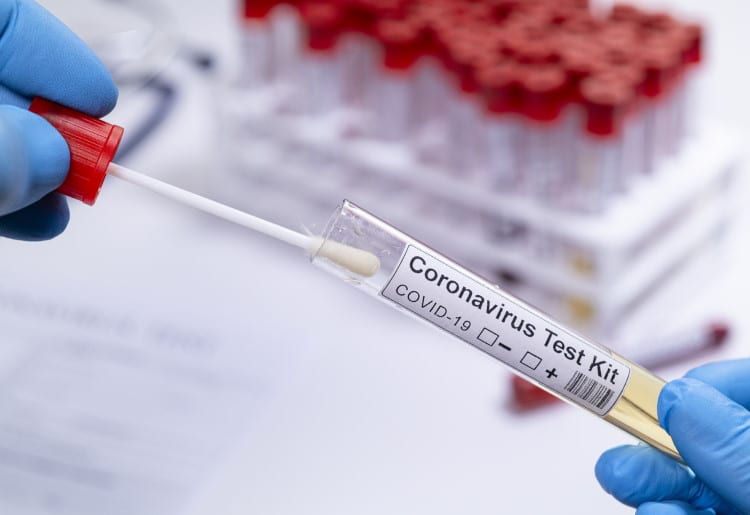More than half a year later, federal agencies are stepping up to make testing safer and more accessible to consumers—a major leap in slowing the spread of COVID-19.
The FDA’s alert that a select few at-home COVID-19 tests are authorized for public release was one notable milestone in the battle to expand testing across the country. It meant the American people could now follow instructions to conduct testing within the walls of their own homes. These simplified at-home COVID-19 test kits ask testers to collect samples via a nasal swab, saliva collection, or throat swab and send them to a credible lab for results.
They eliminate the need for long waits in a doctors’ office—exposing immunocompromised individuals to potential infection—and never-ending lines at drive-thru testing sites in limited areas across the country. But the latest development in COVID-19 testing has many people asking: Are at-home COVID-19 test kits really legitimate, and has the FDA even approved them?
FDA authorized, but not approved? Here’s the scoop.
Certain at-home COVID-19 test kits are currently FDA authorized, but not technically approved. So what exactly does that mean?
The FDA has authorized the sale of at-home COVID-19 test kits for a select few diagnostic companies. Under the FDA’s Emergency Use Authorization, these companies can create and distribute test kits to consumers who wish to test for COVID-19 infection from the comforts of their own home. Most are prioritizing test kits for those who may have already been exposed, are high risk, or are currently experiencing hallmark COVID-19 symptoms such as fever, dry cough, and shortness of breath.
As of October 1, the FDA has authorized tests from the following diagnostic companies to be released for consumer use:
- Everlywell
- hims & hers
- LetsGetChecked
- P23 Labs
- Phosphorus
- Picture by Fulgent Genetics
- Pixel by LabCorp
- Vault
- Vitagene
Currently, all FDA authorized at-home COVID-19 test kits are molecular. Most experts agree that results from molecular tests are highly accurate and do not need to be repeated, unlike a negative result from an antigen test. The FDA worked closely with LabCorb, a global company that provides diagnostic services, to authorize the distribution of safe and accurate at-home COVID-19 test kits under its EUA. In fact, the majority of the diagnostic companies listed above claim their at-home COVID-19 tests offer a sensitivity of at least 98 percent or higher—a reasonable chance of catching active infections if present.
Regulations are in place to filter out fraudulent at-home COVID-19 tests.
Fraudulent test kits and health claims pose serious health risks during a public health crisis. As an agency responsible for regulating products for the safety and security of the American people, the FDA has strict protocols in place to protect consumers from those taking advantage of a pandemic to make a buck.
Prior to the FDA’s EUA on at-home COVID-19 tests, the agency issued warning letters, seizures, and injunctions to companies selling test kits without authorization. Additionally, the FDA has increased enforcement at international mail facilities and other ports of entry to stop fraudulent products from crossing American borders.
The FDA asks the public to report via email any fraudulent test kits for COVID-19 through their agency. You can stay up-to-date on individually-authorized EUAs for at-home COVID-19 diagnostic tests here.
What about COVID-19 antibody testing?
At-home COVID-19 antibody test kits differ in the method and reason for testing. Unlike at-home COVID-19 tests, antibody tests check for past infection. In essence, they check for immune response to infection rather than the infection itself. They’re a bit trickier to create for consumer purchase, as antibody tests are serological in nature—meaning they’re usually collected through a finger prick or blood draw as opposed to saliva collection, nasal swab, or throat swab.
They’re more suitable for those who suspect they may have recently had coronavirus infection and have since recovered. Antibody tests, such as those offered by HealthLabs and Health Testing Centers, test for a type of antibody called immunoglobulin G (IgG). If you’ve been infected and have recently recuperated, your immune system may have produced detectable IgG antibodies to fight off the illness.
Once authorized, COVID-19 serological antibody tests can be equally helpful in slowing the spread of the pandemic. Positive antibody tests may assist healthcare professionals in identifying those who have already developed an immune response to COVID-19. Additionally, those with COVID-19 antibodies could potentially donate a part of their blood called convalescent plasma to treat the vulnerable and critically ill from the virus’s wrath.
Although no antibody tests are currently FDA authorized for at-home use, diagnostic companies are hard at work. Several are still in the process of validating and pursuing FDA EUA for their COVID-19 antibody test products. In particular, Scanwell Health is keeping consumers updated on its validation of their at-home COVID-19 antibody blood test.
You can stay up-to-date with information on FDA authorized COVID-19 antibody test kits here.
As at-home COVID-19 test kits enter the mainstream, we can begin to slow the spread.
Most experts agree we won’t see a future without masks, social distancing, and similar precautions for months to come. As the country awaits news of a COVID-19 vaccine and treatment, at-home test kits offer a safe, accurate way to test for current infection and protect others in the meantime.

